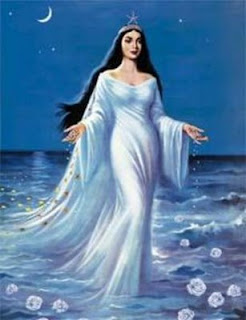Hej c:
Today's post is about something that isn't really Brazilian, but is really present in our culture because of the beliefs of the African slaves and, in a in a predominantly Christian country, these beliefs are seen as "devilish" and a lot of people don't respect it.
Yemanja is an orisha, originally of the Yoruba religion, who has become prominent in many Afro-American religions. Africans from what is now called Yorubaland brought Yemaya/Yemoja and a host of other deities/energy forces in nature with them when they were brought to the shores of the America as captives. She is the ocean, the essence of motherhood, and a protector of children.
Because the Afro-American religions were transmitted as part of a long oral tradition, there are many regional variations on the goddess's name:
Africa: Yemoja, Ymoja, Yemowo, Mami Wata
Brazil: Yemanjá, Iemanjá, Janaína
Cuba: Yemaya, Yemayah, Iemanya
Haiti: La Sirène, LaSiren (in Vodou)
USA: Yemalla, Yemana, Yemoja
Uruguay: Iemanjá
Dominican Republic: Yemalla or La Diosa del mar (sea goddess)
Yemaja is said to be the mother of all orisha. She also is the spirit of water, and her favorite number is 7.
In Brazil, the goddess is known as Yemanjá, Iemanjá or Janaína in Brazilian Candomblé and Umbanda religions.
The Umbanda religion worships Iemanjá as one of the seven orixás of the African Pantheon. She is the Queen of the Ocean, the patron deity of the fishermen and the survivors of shipwrecks, the feminine principle of creation and the spirit of moonlight. A syncretism happens between the catholic Nossa Senhora dos Navegantes (Our Lady of the Seafaring) and the orixá Iemanjá of the African Mithology. Sometimes, a feast can honor both.
In Salvador, Bahia, Iemanjá is celebrated by Candomblé on the very same day consecrated by the Catholic Church to Our Lady of Seafaring (Nossa Senhora dos Navegantes).Every February 2, thousands of people line up at dawn to leave their offerings at her shrine in Rio Vermelho.
Gifts for Iemanjá usually include flowers and objects of female vanity (perfume, jewelry, combs, lipsticks, mirrors). These are gathered in large baskets and taken out to the sea by local fishermen. Afterwards a massive street party ensues.
Iemanjá is also celebrated every December 8 in Salvador. The Festa da Conceição da Praia (Feast to Our Lady of Conception of the church at the beach) is a city holiday dedicated to the Catholic saint and also to Iemanjá. Another feast occurs on this day in the Pedra Furada, Monte Serrat in Salvador, called the Gift to Iemanjá, when fishermen celebrate their devotion to the Queen of the Ocean.
Outside Bahia State, Iemanjá is celebrated mainly by followers of the Umbanda religion.
On New Year's Eve in Rio de Janeiro, millions of cariocas, of all religions, dressed in white gather on Copacabana beach to greet the New Year, watch fireworks, and throw (white) flowers and other offerings into the sea for the goddess in the hopes that she will grant them their requests for the coming year. Some send their gifts to Iemanjá in wooden toy boats. Paintings of Iemanjá are sold in Rio shops, next to paintings of Jesus and other Catholic saints. They portray her as a woman rising out of the sea. Small offerings of flowers and floating candles are left in the sea on many nights at Copacabana.
In São Paulo State, Iemanjá is celebrated in the two first weekends of December on the shores of Praia Grande city. During these days many vehicles garnished with Iemanjá icons and colors (white and blue) roam from the São Paulo mountains to the sea littoral, some of them traveling hundreds of miles. Thousands of people rally near Iemanjá's statue in Praia Grande beach.
In Pelotas, Rio Grande do Sul State, on February 2, the image of Nossa Senhora dos Navegantes is carried to the port of Pelotas. Before the closing of the catholic feast, the boats stop and host the Umbanda followers that carry the image of Iemanjá, in a syncretic meeting that is watched by thousand of people on the shore.
For real, if you think the Devil made this, there's something really wrong with you. I know people who have a real problem with afro-brazilian religions, like "omg, devil blah blah blah". Coincidentally, this person says "not like this band because they made a pact with the devil".
But, yeah, that's it c:
Hej då




